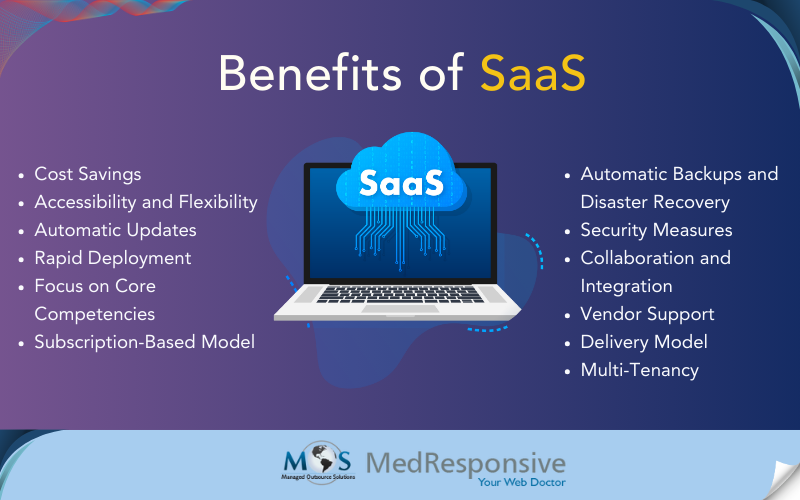Cloud databases and software as a service (SaaS) are becoming more and more popular in today’s business environment because of their many advantages. In the context of Software as a Service (SaaS), leveraging professional database development services can improve cloud-based solution deployment and customization to meet specific business requirements. Database developers can contribute to optimizing the performance, scalability, and functionality of SaaS applications, ensuring that they effectively meet the unique needs of a business. This approach helps in creating a more tailored and efficient software solution within the SaaS framework.
Let’s take a look at some of the main arguments in favor of SaaS and cloud database development solutions.
Benefits of SaaS
Cost Savings
SaaS spares businesses from having to make upfront investments in software licenses, hardware, and infrastructure. As an alternative, users pay a subscription fee, which lowers the upfront capital costs. SaaS providers take care of upkeep, upgrades, and support, relieving internal IT teams of some of the work and cutting expenses.
Accessibility and Flexibility
Since SaaS apps are usually hosted in the cloud, users can access them from any internet-connected device. This facilitates teamwork, remote work, and flexible software access. SaaS solutions are easily scalable to meet evolving business requirements. Customers are able to modify their subscription plans according to the features or user count that is needed.
Automatic Updates
In order to guarantee that customers always have access to the newest features, improvements, and security patches, SaaS providers oversee and distribute frequent updates. This guarantees a consistent user experience and does away with the need for manual updates.
Rapid Deployment
SaaS solutions can be swiftly implemented because the required infrastructure is already in place. This lowers the time-to-market for new applications by enabling enterprises to quickly deploy new software.
Focus on Core Competencies
Organizations can concentrate more on their core business operations by outsourcing to SaaS providers the technical aspects, upkeep, and support of software. This increases productivity generally and frees up teams to focus on strategic projects.
Subscription-Based Model
Subscription-based pricing for SaaS makes things more predictable and easier for businesses to handle. Recurring payments from users for the services they use enable more effective cost and budgeting.
Automatic Backups and Disaster Recovery
Strong backup and disaster recovery procedures are frequently included by SaaS providers. In the event of data loss or system failure, this guarantees that data is regularly backed up and can be quickly restored.
Security Measures
SaaS companies make significant investments in security protocols, such as access controls, encryption, and compliance certifications. This frequently produces an environment that is more secure than what many organizations could accomplish by themselves.
Collaboration and Integration
SaaS apps are made to make it easier for users to collaborate. APIs make it simple to implement integration features, which enable smooth communication between various software tools. These features are frequently built-in.
Vendor Support
Customer service is usually included in the package offered by SaaS providers. This guarantees that when needed, organizations can get technical support, troubleshooting, and expertise.
Delivery Model
SaaS eliminates the need for users to install, maintain, and update software locally by delivering it over the internet.
Multi-Tenancy
Multi-tenancy, or allowing multiple users or organizations to use the same instance of the software while maintaining the security and separation of their data, is a feature that most SaaS applications support.
SaaS Applications for Various Requirements
Customer Relationship Management (CRM)
Salesforce: A top-tier CRM system that aids businesses in managing their marketing, sales, and customer relationships.
Office Productivity and Collaboration
Microsoft 365 (formerly Office 365): Offers a range of productivity tools, such as Microsoft Teams for collaboration and Word, Excel, and PowerPoint.
Project Management
Asana: A project management tool that lets groups of people plan, arrange, and monitor work together.
Human Resources (HR)
Workday: A cloud-based application for finance and HR that handles a range of HR tasks, such as talent management, recruitment, and workforce planning.
Enterprise Resource Planning (ERP)
SAP S/4HANA Cloud: An ERP suite that unifies different business operations, including supply chain management, procurement, and finance.
Accounting and Finance
QuickBooks Online: A cloud-based accounting software program that aids companies in handling their billing, reporting, and financial transactions.
Document Management and Collaboration
Google Workspace (formerly G Suite): A collection of cloud-based tools, such as Google Docs, Sheets, and Drive, for email, document editing, storing, and collaborating.
Marketing Automation
HubSpot: Provides a range of tools for sales, marketing, and customer support, including lead generation, email marketing, and CRM functionality.
Customer Support and Help Desk
Zendesk: A platform for customer support that offers live chat, ticketing, and a knowledge base to facilitate customer interactions.
E-commerce Platforms
Shopify: A software-as-a-service (SaaS) e-commerce platform that lets companies create online stores, manage their inventory, and process payments.
Benefits of Cloud Databases
Scalability and Cost Savings
Cloud databases provide scalable solutions that are easily adaptable to changing data storage needs. Companies don’t need to make large hardware investments in order to scale up or down in response to demand. It is also cost-effective because they can adjust their resources based on demand.
High Availability and Reliability
High availability is built into cloud databases, which frequently have redundant servers and data centers. This reduces the possibility of downtime and guarantees data accessibility at all times
Data Security
Cloud service providers make significant investments in security features like access controls, encryption, and recurring audits. This frequently produces an environment that is more secure than what many organizations could accomplish by themselves.
Global Accessibility
Cloud databases offer global accessibility, allowing users to access and interact with data from various geographic locations. Businesses with a global clientele or a dispersed workforce will particularly benefit from this.
Performance Optimization
Tools and services for improving database performance are frequently provided by cloud database providers. Features like load balancing, caching, and automatic scaling might be included in order to guarantee peak performance under various workload conditions.
Custom web app development services rely on data stored in the cloud. The architecture and design choices made during the development process can impact the overall availability and performance of the application. In the in the ever-evolving digital landscape, integrating SaaS apps and cloud databases is a strategic move that establishes a responsive and dynamic ecosystem for effectively managing campaigns, customer data, and analytics
Optimize your business processes with our advanced web application development solutions!





